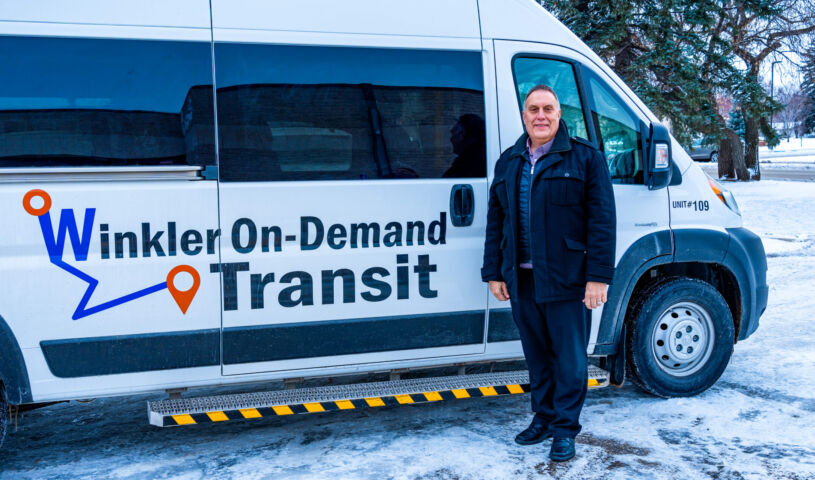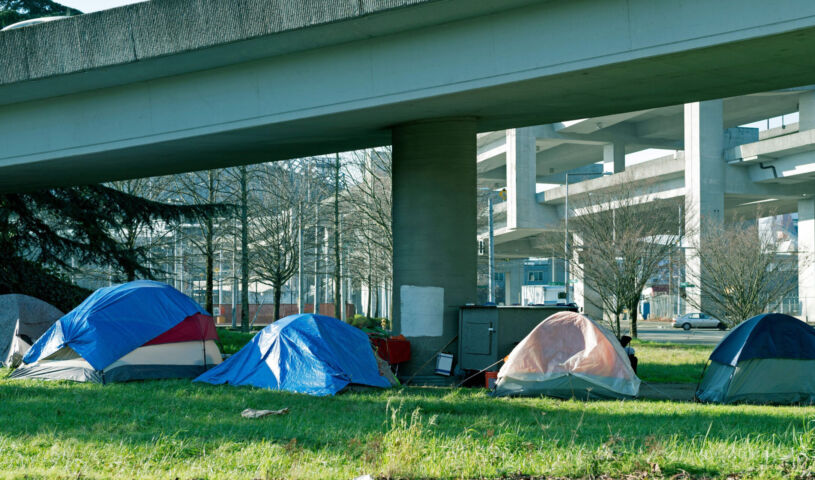Manitoba city launches on-demand transit pilot
 The City of Winkler, Man., recently launched a new on-demand transit pilot that officials hope will improve the way residents are able to get around town. Photo: City of Winkler
The City of Winkler, Man., recently launched a new on-demand transit pilot that officials hope will improve the way residents are able to get around town. Photo: City of Winkler
The City of Winkler, Man., recently launched a new on-demand transit pilot that officials hope will improve the way residents are able to get around town.
The pilot is a flexible public transportation service that allows residents to book transit rides in the Winkler area through a mobile app. The service, which launched on Nov. 27, operates within Winkler and provides transportation to and from the nearby Boundary Trails Health Centre.
The city says the pilot is expected to run for the next three years. It will begin with one operating vehicle that has space for a total of eight passengers including one wheelchair accessible space. The cost of a one-way ride is $5 per booking.
Winkler Mayor Henry Siemens said that local community groups told the city that a transit service was needed.
“Our community has told us that a service is needed,” Siemens said. “And that we have to find a way to help people move who are either not able to or not interested in having multiple vehicles in a household.”
On-demand Transit Opportunity
People wanting to request a ride can do so through the Blaise Transit app. Blaise Transit is a Montreal-based company that specializes in providing software to manage on-demand transit services.
In Winkler, Blaise’s platform enables passengers who want to book a transit trip to submit their destination and desired arrival/departure time through the Blaise app, website, or via phone. Their trip request is automatically scheduled, and a bus route is created based on all the trip requests that are received.
Riders are then notified of what time they’ll be picked up, and they can see their transit vehicle arrive in real-time if they are using the Blaise app.
“On-demand transit can improve passenger flexibility, wait times, and total travel time,” said Olivia White, business development representative at Blaise Transit. “This type of public-transit is particularly suited to smaller-sized communities that don’t have the resources to provide high-frequency fixed-route transit. It has the ability to enhance the quality of life and access to jobs and services for people who would otherwise be unable to travel to these opportunities.”
Siemens said the pilot project will provide the city with more information about the transit needs of residents. If demand proves great enough by the end of the pilot, the city may investigate extending it or expanding to develop a more traditional transit service.
“We’re hoping that over the course of this three-year pilot project we’re going to find out from our community where they need to move from, where they need to move to, and when they need to do that,” Siemens said.
Green Municipal Fund Investment
Winkler received a $500,000 investment from the Federation of Canadian Municipalities through the Green Municipal Fund (GMF) to support the project. Winkler budgeted around $300,000 for the initiative.
Siemens said that without the additional funding it would have been a much smaller-scale project.
“We were very please to see that the Federation of Canadian Municipalities came in with the contribution to this program,” Siemens said. “That’s allowed us to scale this to a place that is going to effectively serve our community.”
The pilot builds on findings from a previous GMF-supported feasibility study in Winkler that explored viable public transportation options, including a ride-sharing program.
“The transportation sector is responsible for approximately 25 per cent of greenhouse gas emissions in Canada. Municipalities are rising to the challenge, seeking innovative ways to reduce pollution while enhancing the quality of life for their residents,” said FCM President Rebecca Bligh. “The City of Winkler’s pilot project exemplifies this spirit, aiming to decrease the number of vehicles on the road while providing essential services to those in need.”
The pilot is anticipating conducting 11,000 trips per year, while aiming to reduce greenhouse gas emissions by 30.8 tonnes of CO2 per year by having fewer vehicles on the road and encouraging group transit.
“Investing in public transportation at the local level creates jobs and reduces long-term costs and greenhouse gas emissions for a safer and more resilient future for residents of municipalities like the City of Winkler,” said Minister of Environment and Climate Change Steven Guilbeault.
Expansion of On-demand
On-demand transit is becoming more popular with large and small municipalities across Canada. In August, Winnipeg Transit announced it was expanding it’s on-demand service, On-Request, to the city’s northwest.
“By integrating On-Request into more communities, we are making it easier for Winnipeggers to connect with jobs, education, and essential services,” said Mayor Scott Gillingham. “Enhancements like this help set the stage for the launch of our new transit network next summer.”
On-Request was launched as a pilot in 2021 and has since become a permanent service.
“As one of the representatives for the northwest area, I am thrilled to announce the addition of a fourth zone to Winnipeg Transit’s On-Request service,” said Coun. Vivian Santos. “This new zone will provide enhanced transit options for our community. It is a significant step forward in improving accessibility and convenience for our residents.”
Council in the town of Bradford, Ont., recently endorsed shifting from a fixed route transit system to an on-demand transit system, instructing staff to implement an on-demand transit pilot next year. “It’s a great opportunity for us,” Mayor James Leduc said.
In at report to council, Deputy CAO Mahesh Ramdeo said an on-demand transit service would improve service quality and reduce wait times.
“Staff recommend the implementation of an on-demand transit service to all areas within the urban boundaries,” Ramdeo said. “This would provide access to all residents of the urban area versus the limited access on a fixed route system.” MW
✯ Municipal World Executive and Essentials Plus Members: You might also be interested in Joey Cyples’ article: Sustainable, responsible, available net-zero transportation now.
Ibrahim Daair is staff writer at Municipal World.
Related resource materials:



